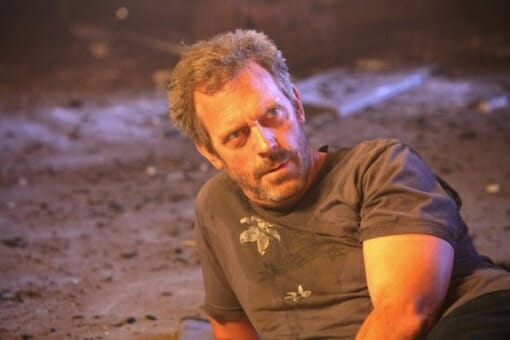By Becky Kifer · May 24, 2012

I’ve watched an exorbitant amount of television over the past eight years (and probably ruined what was left of my already Mr. Magoo-ish eyesight in the process), but no matter the shows that passed my way, something always drew me back to House.
As a TV show, it had so few of the traits that I usually require in must-see viewing. The stories were always stationary, the cast rotated too much, characters were never in quite enough peril—I’ve stopped watching things for lesser offenses. Once you’ve seen one obstructed bowel via bloody CGI zoom in, you’ve seen them all.
And yet, there was always something about House and its cantankerous antihero that was inexplicably mesmerizing. When House was bad, it was still pretty good, and when House was great, it was the best character study on TV.
The series finale, titled “Everybody Dies,” opened with House (Hugh Laurie) in an abandoned building after a two-day heroin bender, fire crackling ominously beneath the floorboards, and the corpse of a former patient next to him. As he was greeted by a hallucination of the deceased Kutner (Kal Penn), the final episode of House began to look like a smashup of The Hangover and A Beautiful Mind.
This wasn’t the first time House has talked to his subconscious in the form of a dead teammate, of course—Amber (Anne Dudek), who also appeared in the episode, ushered him into a mental asylum three seasons prior. The cameos didn’t just stop with the deceased though, as old flame Stacy (Sela Ward) and former duckling Cameron (Jennifer Morrison) also materialized to convince the suicidal House that life—even without a dying Wilson, even in prison—was still worth living. (Lisa Edelstein’s Cuddy, however, was conspicuously absent.)
Eventually swayed, House tried to escape, only to find himself trapped by the flames. Foreman (Omar Epps) and Wilson (Robert Sean Leonard), who’d been searching for the missing House, eventually located the building but were unable to get inside. This provided just enough time for House to see Wilson out the window, and Wilson to stare back in horror, just before a beam crashed down inside, killing House.
A memorial service followed, where everyone waxed poetic about what House had taught them. Wilson followed suit, only to midway through his eulogy tell the truth: House was a miserable ass who constantly berated them, and had left him to die alone. In the middle of his tirade, however, Wilson received a text message: “SHUT UP YOU IDIOT.”
Avoiding a fiery death, House had managed to escape out the back, subsequently faking his own demise in the process. And like that, the medical Sherlock Holmes finally got his Reichenbach.
Carping on the repetitive nature of House—introduce patient, misdiagnose, misdiagnose again, light bulb moment, cure!—became a pastime for some. It was formulaic, yes, but I ask as eloquently as possible: So? House was conceived as a live-action medical casebook, not General Hospital. Background drama was intrinsically weaved into the story, but at the end of the day it was about solving puzzles in 42 minutes or less.
Of course, my compassion toward the paint-by-numbers storytelling does involve a fairly large caveat in the form of one Hugh “House is British?” Laurie. As the series finale snarkily reminded us, “nobody cares about the medicine.” The line, delivered by Laurie himself, served as both a gag for longtime viewers and the mission statement of the last eight seasons.
Strong scripts, solid performances and very-special-episodes were all valuable, but House worked, on all levels, because of the trickster spark in Laurie's eyes. Even at the show’s worst, through an annoying police detective and the ramming of a car through an ex-girlfriend’s front window, you stayed for what Laurie would do next.
I hadn’t rewatched the pilot since its original airing in 2004, and I’d forgotten how the crisp, cinematic aesthetic that the show perfected over the years was sorely lacking in the first go around. The original trio of Foreman, Cameron, and Chase barely look old enough to drive, much less have medical licenses.
It’s the parallels that stick out the most, perhaps none more poignant than the very first and the very last time you see Gregory House on screen. Each moment, eight years apart, he shares the frame with James Wilson. Leonard’s patient, deadpan oncologist was an unsung foil next to Laurie’s ascetic diagnostician. It’s this relationship, and only this relationship, that humanized House. He cared about his team (by pretending he didn’t care), but in the end every Holmes needs his Watson.
At its most basic, it was Wilson who kept House grounded, and House who pulled Wilson from the tediousness of life. When the two were on screen, a chortle (yes, I chortle) was never far behind. They’ve shared an office balcony, an apartment, and numerous plates of food (Wilson paid, House ate). In House’s words, they were at times “two tigers away from an act in Vegas.” Wilson’s cancer diagnosis was heartbreaking, if not ironically inevitable, but it also served their story.
The show needed both House’s head, as well as Wilson’s heart, to succeed. And in the end, although House conned the world one last time, he didn’t con the person who mattered most to him. House sacrificed everything he had—his career, his freedom—to be with Wilson in his remaining months. It was the first, and probably the last, unselfish act of House’s life.
Melodramatic, perhaps; but also, I think, just what the Machiavellian doctor ordered.